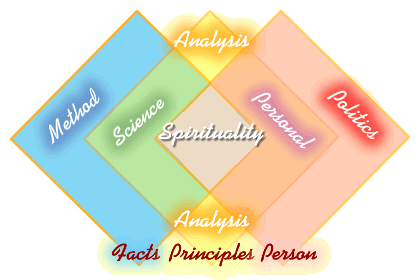Filognosy
Contents
Love for the knowledge of self-realisation as inspired by as well the western as eastern concepts of emancipation that together make for the integrity of the different views, forms of logic and intelligence one finds in modern society on a global scale.
Filognosy literally means: love for knowledge.It can be pronounced two ways: as in file and as in philosophy. The word can also be written with a ph instead of an f. The term is used to contrast the term philosophy as not just the love for wisdom or its development is the goal but more the love for knowledge, the spiritual knowledge of Christianity or gnosis if you like, as it is in its entirety. In the concrete world the term implies the practice of inducing oneness and harmony of consciousness in the fields of facts (method/science), principles (analysis/spirituality) and the person (personal/politics) by means of contemplation, discourse and service to the natural order of time as the method for countering the troubles of not knowing (see also the instruction site Filognosy). The concept is nicely summarized in the following image:

Filognosy, initiated by Aadhar (René P. B. A. Meijer) started as a meditation exercise in a New Age center in the late nineties in Enschede, the Netherlands. Later on it developed the status of a lead of scientific, spiritual and religious reform in general, based on the vedic knowledge originating from the indian philosopher Vyâsadeva, who lived about five thousand years ago. Aadhar translated the S'rîmad Bhâgavatam faithfully, in following the example of his precurser in Holland S'rî Hayes'var das (H. v. Teylingen - 1938-1998), and presented it on the internet. Filognosy as such is his summary and comment to the vedic knowledge involved in reforming one's life to the values of yoga philosophy in a narrow sense and the whole field of western scientific thinking, spirituality and the by the person determined politics in a broader sense.
Classical reference
The classical reference for the division is formed by the six darshanas or visions fundamental to the philosophy of India that constitutes the basis for the structure of the knowledge of the Bhâgavata Purâna of Vyâsadeva. To the filognostic version of the sixfold of the philosophical method, paradigmatic science, artistic analysis, the transcending spirituality, the religiously connoted personal and the political of comments and compromising adaptations, is it so, as it is with the original darshanas, that the visions have in common:
- 1) The concept of a conscious and continuing self or soul.
- 2) The concept of the cross or workload an individual, family or nation carries.
- 3) The perspective for a solution of being liberated in service.
- 4) The acknowledgment of the authority of an established culture of scriptural reference.
In western philosophy we find with the philosopher D. Hume in his Treatise on Human nature (I.III-1 - About knowledge) a division in seven terms with which more or less the filognosy can be described as the identity of the similarity in philosophical considerations concerning the natural order of the relations of time and place, to which the relations of quantity, numbers, the beauty and the art of analysis, combined with the quality of the level of transcendence and connectedness in austerity, lead to the arguments of cause and effect in religion and biography of the science of the person, in such a way that in the end the opposition of the politics of societally assuming responsibilities is attained. With the political opposites is the filognostic, contrary to the materialist who identifies himself onesided, then united in his consciousness of the dualities. He oversees the structure, he sees the coherence. Ultimately is the filognostic a yoga-practicioner following the dictum: 'unity in diversity'.
Political relevance
The filognostically found opposition between political parties and election groups so constitutes the social and personal reflection of the quest for the integrity of:
- 1) The balance between the fortune and the six basic divisions, which as well define the materialism with the conflict of the ego of material compensations and obscurity belonging to it.
- 2) The virtue of the quality versus the quantity in the internal and external fields of action.
- 3) The representation of the personal versus the impersonal relating to the source of knowledge in the form of teachers.
- 4) The identity and age of status-orientation groups and degrees of experience with which the game of societal order is played by each and everyone.
In short is filognosy politically concerned with finding the equilibrium of the virtue of the representation of identity.
Etymology
The word filognosy is derived from the greek word filo - love and gnosis - knowledge. Thus the meaning in the sense of love of knowledge.
Vedic Equivalent
The spiritual knowledge of filognosy is closest to the vedic term Âmatattva; which literally means, the principle or reality of the soul, which is also described as spiritual knowledge in general.
Philosophical Classification
Philosophically may filognosy be described as naturalistic idealism.
Logo
Logo: After the prayer of filognosy the integrity of the filognostic commitment being symbolically presented, looks like this:

See also
- The definition of materialism, in which the definition of filognosy plays a central role.
- The three basic disciplines of filognosy.
- Prayer
- Vow
- Gnosis
Links
- Filognosy or the Orde of Time - How to have a life? A good introduction into the field of filognosy are the introductions and the synopsis of the different sections of the site The Order of Time.
- Filognosy - basic instruction site offering definitions, so-called rounds, filognostic art, a list of basic terms and more.
- The filognostic Confession - the basics of the filognostic tenet summed up in 170 articles.
- A Small Philosophy of Association - filognosy clear about the political implications.
Category: Definitions | English
Page views for this page since July 28 2009: \\
